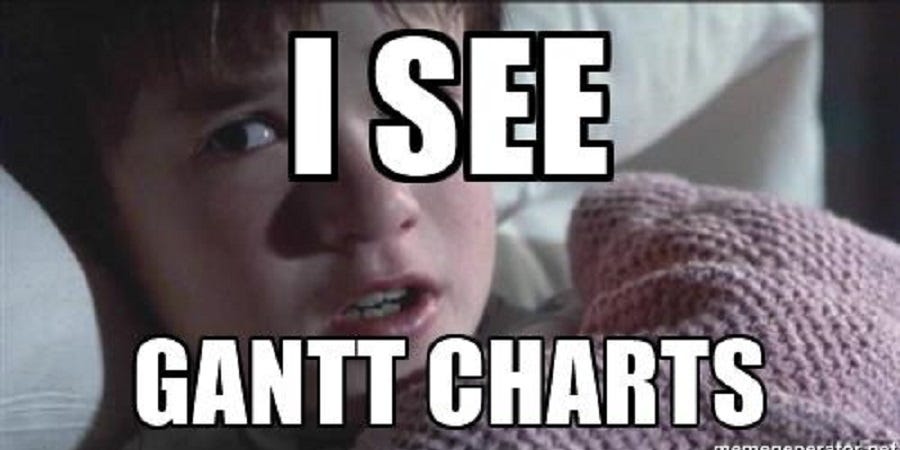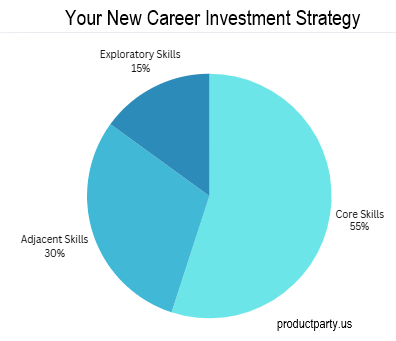How to: Not become the human equivalent of a floppy disk.
We need to start sorting out our next moves as product folks before we go extinct.
Remember when creating beautiful roadmaps was your superpower?
Those days of color-coded Gantt charts earning gasps of amazement are fading fast - basic roadmapping requirements have dropped 62% since 2023.
Your once-essential skill set isn't gently declining; it's cliff-diving while waving goodbye.
The Awkward Truth About Your Current Job Description
Before you close this tab and go back to pretending everything's fine, let me drop some reality: nearly half of what made you hireable yesterday is rapidly depreciating.
Here's what's happening to your traditional product toolkit:
Basic Roadmapping: AI now handles 40-60% of conventional roadmapping tasks. Your beautiful Gantt charts are heading to the digital retirement home.
Generic User Stories: 78% of PMs use AI for prioritization.
Vanity Metric Worship: 61% of PMs prioritize strategic work over vanity metrics.
I can already hear you thinking, "But I'm great at those things!"
That's like being the world's best horse-and-buggy driver the day after Ford released the Model T.
The future has other plans, and they don't include manually color-coding project timelines.
The New Currency: Skills That Actually Appreciate
While your trusted tools are depreciating faster than a new car driving off the lot, a whole new skill ecosystem is exploding in value:
Legacy System Translation: 56% of enterprises prioritize system modernization. It turns out that understanding those ancient COBOL systems is like owning beachfront property - see also my post on that COBOL life.
Ethical AI Guardrails: 84% of executives prioritize ethical AI frameworks because nobody wants their AI to turn evil (or worse, inefficient).
Regulatory Chess: The average product now faces 23 compliance requirements across jurisdictions, up from 9 in 2020. Being regulation-fluent is the new bilingual.
We're witnessing "The Great PM Bifurcation" - product folks who evolve into strategic interpreters between legacy and future systems will thrive, while those clinging to easily automated skills will become irrelevant.
The data doesn't lie: PMs who adopted strategic reskilling saw 2.3x faster career progression.
The question isn't whether you need to evolve - it's how quickly you can pivot before your current skills flatline.
Your New Career Investment Strategy
Think of your skills like a financial portfolio.
You'd never put all your money in a single declining stock, right?
(Note: if you would, please call a financial advisor before finishing this article)
According to my fuzzy math, here's your new asset allocation strategy to adapt to these changes:
55% Core Skills: Understanding legacy systems, ethical AI frameworks, regulatory anticipation.
30% Adjacent Skills: Learning and deploying devOps fundamentals, compliance basics, data ethics.
15% Exploratory Skills: Kicking the tires on quantum computing implications, behavioral economics, and analog system analysis.
And just like any good investment portfolio, you need a "Skills Burner" list – capabilities you're deliberately phasing out.
Consider it professional inventory management – regularly assessing which skills no longer deliver the returns they once did and making room for new investments that better align with tomorrow's market demands.
How to Do This Without Having an Existential Crisis
The Weekly Skills Audit: Spend 30 minutes each Friday asking, "Which of my skills contributed actual value this week?" Be brutally honest.
The Reverse Mentorship Hack: Find someone who knows those legacy systems that still run 78% of financial transactions. Buy them coffee. Lots of coffee.
The Ethical AI Red Team Exercise: Allocate 10% of your sprint time to intentionally trying to "break" features ethically. One FinTech startup saved $4.2M in litigation costs with this approach.
The Regulatory Chess Game: Set up Google Alerts for regulatory changes in your industry. Being ahead of this curve makes you invaluable.
Your Next Move
The future of product management isn't about mastering Jira or creating prettier roadmaps.
It's about becoming the bridge between the complicated legacy systems of yesterday and the ethical, compliant AI-driven solutions of tomorrow.
So, what skill will you sunset today to fund your next capability investment?
Because while change might be uncomfortable, becoming obsolete is significantly worse.
Trust me – floppy disks never saw the USB drive coming, and they're not exactly thriving on the job market these days.
Until next week,
Mike @ Product Party
Thanks for reading! Please like, comment, share, and subscribe if you haven't already. You can also show your support by clicking this link and buying me a coffee.








+100 on the regulations.
A lot of PMs take this for granted as not really impact but the complexity of aligning so many people in figuring out how to follow regulations is a gold mine
Enlightening article. But Gantt charts were usually always be n the domain of project managers. In my experience product managers focused less on busy work like acting like scrum masters, and more focused on engagement metrics, KPIs, RICE framework, customer journey mapping, roadmapping. But, have become quite focused lately on acting like a glorified project manager - aka feature manager.
Wdyt?